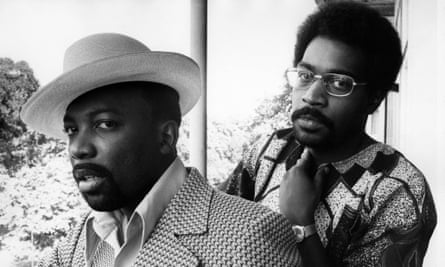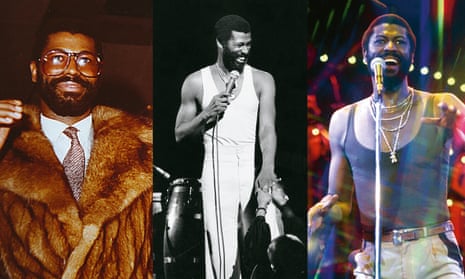“With Teddy, we realised it was all about sex,” says his manager Shep Gordon at one point in new doc Teddy Pendergrass: If You Don’t Know Me. Gordon didn’t have to do a lot of market research to come that conclusion: Teddy Pendergrass oozed sex – in his music, in his stage act, in his lifestyle. He was the Godfather of Sex. His music, especially at the peak of his solo career, was very much in the groove of smooth, seductive soul, powered by a husky, passionate-yet-effortless baritone. “One guy said to me: ‘Teddy Pendergrass was an early form of Viagra,’” says Olivia Lichtenstein, the documentary’s director. “And all the guys loved Teddy because he’d get the women in the mood for them.”
Pendergrass was sexy as well as sexual. He was a tall, handsome, stylish man, given to performing in a white vest and a layer of sweat. Think Barry White in the body of Idris Elba. By all accounts, women found him irresistible, and Pendergrass felt obliged to love as many of them back as he possibly could. They rushed the stage and threw their underwear at him when he performed. They disguised themselves as maids to get into his hotel room. Gordon’s big idea was to put on women-only concerts – “Spend the night with Teddy” – where women would be given chocolate teddy-bear lollies to suck as they swooned to slow jams such as Turn Off the Lights (sample lyrics: “Turn off the lights and light a candle / Tonight I’m in a romantic mood / Let’s take a shower together / I’ll wash your body and you’ll wash mine / Rub me down with some hot oils, baby, yeah / And I’ll do the same thing to you”).
“I think the tone of his voice hit a certain centre in them, or something,” suggests James Carter, who played drums in his band for seven years, and therefore had a ringside seat on the Pendergrass effect. “He wasn’t built like Arnold Schwarzenegger or nothing, he came out in that wife-beater T-shirt and they went crazy. We didn’t understand it. I don’t even think he understood it.”
The legend of Teddy Pendergrass, who died of cancer in 2010, might be better known had it not been cruelly curtailed at both ends. His early career is obscured by the fact that he rose to fame in a band that did not carry his name: Harold Melvin & the Blue Notes. Everybody knows their biggest hits: Wake Up Everybody, If You Don’t Know Me By Now, The Love I Lost, and Don’t Leave Me This Way. But to this day, most people assume the guy who sang those tunes was Harold Melvin, but no: it was Pendergrass. Perhaps that also explains why so many of their songs were covered by other artists, most notably Thelma Houston, who refashioned Don’t Leave Me This Way into a disco smash in 1976. That same year, fed up with not getting enough of the credit or the cash, Pendergrass quit the band.
As a solo artist, Pendergrass was often called the “black Elvis”. He had four platinum albums in a row, and all the trappings of success, including a huge, Graceland-like mansion, a fleet of luxury cars, a stable of horses, even his own jeans label. And he was just getting started. Then, in 1982, driving home one night, he crashed his green Rolls-Royce into a tree, breaking his neck. He would never walk again. He was 31 years old.
Conspiracy theories abound around Pendergrass’s crash, which is partly a reflection of the lawlessness of the Philadelphia music industry at the time. Pendergrass described his upbringing as a “typical ghetto story”: born to a poor single mother, he barely knew his father, who was killed when Pendergrass was 12. He came of age as the city was finding its own soul sound – a silkier alternative to rivals such as Motown, bridging the gap between funk and disco. Philly soul became a phenomenon, largely powered by songwriting-production duo Kenny Gamble and Leon Huff, who churned out hits not only for Melvin but also the O’Jays, the Three Degrees, Patti LaBelle, Billy Paul, Lou Rawls and more. Having started out as the Blue Notes’ drummer, Pendergrass was quickly promoted on the strength of his voice and became the scene’s biggest star. “You gotta give a voice like that some raw meat,” as Gamble puts it. “We really had to dig deep into our souls to come up with songs that he was gonna be able to execute.”

It wasn’t just the female fans who wanted a piece of Pendergrass. In 1976, Taaz Lang, his girlfriend and first manager, was shot dead on her doorstep. The case remains unsolved: many blamed the “black mafia” – local criminals who resented Lang’s control of such a prize asset. Friends of Pendergrass also recall how, before his crash, he had found the brake cables cut on some of his other cars. Then again, Pendergrass liked to drive fast and had apparently just trashed his Maserati the week before the crash. There were also reports he had been having trouble with his new Rolls-Royce (the car company later paid him compensation).
Complicating matters further was Pendergrass’s relationship with the Philadelphia police. As a conspicuously successful black man who drove around town in a flash car, the singer was a regular target. At the time of the accident, he was reportedly suing the police for $500,000 for harassment. And then there was his passenger that night: Tenika Watson, a transgender performer, whom Pendergrass was taking back to his house, having already abandoned his original date that evening. Pendergrass suspected the accident was a police revenge job. At the scene of the crash, he begged the relatively unharmed Watson not to leave him alone, saying: “Don’t let them hurt me.”
In case it is not evident by now, Pendergrass was something of a philanderer. His wife Karen and other partners took it as a given that when he toured, Teddy would sleep with whomever he wanted. “I’m very choosy about women,” Pendergrass told an interviewer in 1978. “I’m not about to have any lady who’s going to run me down and say I’ve got to report to her where I’m at. She has to realise that I’m a travelling entertainer, and if it’s rough on her that’s the end of that.” He fathered three children by two different women, all of whom were born in 1974.
“I find it extraordinary,” admits Lichtenstein. “I would say to [Karen]: ‘How could you have dealt with that?’ And she was like: ‘You know that’s just the way it was.’ If you were gonna be with a man like Teddy, that was part of the deal.” And yet, they still functioned as a family. “The children used to spend lot of time with Teddy. It was very, very important to him to be a father because he’d felt the absence of his own father so keenly.”

Pendergrass’s philandering even extended to the wife of his one-time arch-rival Marvin Gaye. In her memoir, Janis Gaye tells how she snorted cocaine with Teddy out on a date one night while Marvin stalked them outside. Gordon also tells of how he became Pendergrass’s manager by challenging him to an all-out drugs bender. “If you’re still standing at the end of it you don’t need me,” Gordon told him. “If I’m still standing, you need me.” It sounds like quite a party. “Grass, cocaine, mushrooms, ’ludes, women coming and going. Oh, we were bad,” Gordon recalled. After a few days, Pendergrass collapsed first. Gordon was his manager for the rest of his life. It is tempting to project some mythical narrative on to Pendergrass’s fate. He was a rich, conspicuously successful, overtly sexual black man – something America had never really seen before the 1970s. And he was living life to the full. To many, such a situation could not go unpunished, whether by unknown humans or some higher power. Mere automotive malfunction seems too prosaic an explanation. “It’s a story about how fragile life is,” suggests Lichtenstein, “how everything can change from one moment to the next.”
Pendergrass at least found some form of redemption. Having grappled with depression and suicidal thoughts after the crash, he began to sing and perform again. In true Pendergrass fashion, his comeback was in front of the largest possible audience: Live Aid, which took place in his home town in 1985. A surprise guest of Ashford and Simpson, he was greeted with rapturous applause by the predominantly white crowd. Having inspired such sexual desire in his audiences in his prime, Pendergrass elicited an more compassionate, more platonic kind of love that time. Tears streamed down his face as he sang from his wheelchair. It was quite a moment, says Carter, who was with him that day: “He went back out not as a person that was trying to be the greatest singer that ever was; he went back out as trying to prove to himself and other people that he wasn’t going to let his disability dictate his ability, and he accomplished that.”
Pendergrass went on to record several more albums, duetted with Whitney Houston on her debut and became just about the first wheelchair-user in mainstream music, appearing on stage and in videos. And clearly, he regained some of his faculties with regard to women – to the extent that he and his wife Karen divorced in 2002. “I said to Karen: ‘You have stuck by him all that time, through the accident. What happened?’” Lichtenstein explains. “And she said: ‘I just couldn’t take the women any more.’”
Teddy Pendergrass: If You Don’t Know Me is in cinemas now











Comments (…)
Sign in or create your Guardian account to join the discussion